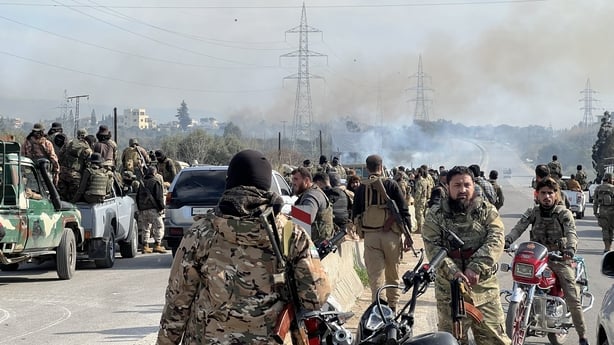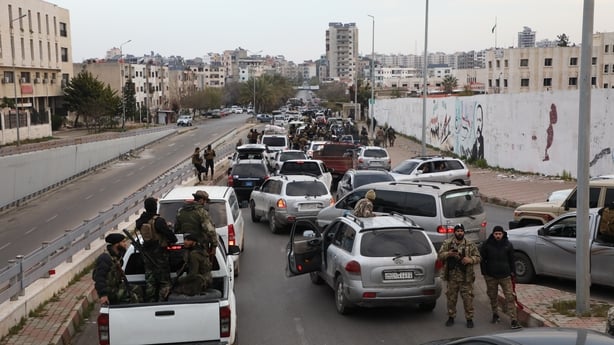A Syrian war monitor has said that security forces and allied groups killed 830 Alawite civilians over the past four days.
The Syrian Observatory for Human Rights said the latest deaths among Alawite civilians pushed the overall toll in violence since Thursday to 1,311, as fighting killed 231 security personnel and 250 fighters loyal to ousted president Bashar al-Assad.
Syrian leader Ahmed Sharaa is scrambling to contain some of the deadliest violence in 13 years of civil war, pitting Assad loyalists against the country's new Islamist rulers.
The top commander of a Syrian Kurdish armed group, whose forces are in a separate battle with Turkey, blamed Turkish-backed Islamist factions for some of the most disturbing violence: the reported executions of civilians belonging to Assad's Alawite sect.

Turkey did not immediately respond to the allegation.
Interim President Sharaa's office said it was forming an independent committee to investigate the clashes and killings by both sides.
Syrians have circulated graphic videos of executions by fighters. Reuters could not immediately verify the videos.
A Syrian security source said the pace of fighting had slowed around the cities of Latakia, Jabla and Baniyas, while forces searched surrounding mountainous areas where an estimated 5,000 pro-Assad insurgents were hiding.
Mr Sharaa, who faces the challenge of ruling a country fraught with factional tensions, urged Syrians not to let sectarian tensions further destabilise the country.
We need your consent to load this rte-player contentWe use rte-player to manage extra content that can set cookies on your device and collect data about your activity. Please review their details and accept them to load the content.Manage Preferences
"We have to preserve national unity and domestic peace, we can live together," President Sharaa said at a mosque in his childhood neighbourhood of Mazzah, in Damascus.
"Rest assured about Syria, this country has the characteristics for survival ... What is currently happening in Syria is within the expected challenges," he said.
Rebels led by Mr Sharaa's Sunni Islamist Hayat Tahrir al-Sham group toppled Assad's government in December.
Mr Assad fled to Russia, leaving behind some of his closest advisers and supporters, while Mr Sharaa's group led the appointment of an interim government and took over Syria's armed forces.
Assad's overthrow ended decades of dynastic rule by his family marked by severe repression and a devastating civil war that began as a peaceful uprising in 2011.
The war, in which Western countries, Arab states and Turkey backed the rebels, while Russia, Iran and militias loyal to Tehran backed Assad, became a theatre for proxy conflicts among a kaleidoscope of armed factions with different loyalties and agendas.
It has killed hundreds of thousands of people and displaced millions of Syrians.
Since Assad's overthrow, Turkish-backed groups have clashed with Kurdish forces that control much of northeastern Syria.
Israel has separately struck military sites in Syria and is lobbying the US to keep Syria weak, sources have told Reuters.
Syria's infrastructure is meanwhile decimated by the war and Assad-era US sanctions remain in place, compounding the challenge of stabilising the country.
The US urged the Syrian authorities to hold to account the "radical Islamist terrorists" that have killed people and said it stood with the country's religious and ethnic minorities.
UN human rights chief Volker Türk also called on the interim leadership to bring the perpetrators to account.

After the relative calm following the ousting of Mr Assad, violence has spiralled as forces linked to the new Islamist rulers began a crackdown on a growing insurgency from the Alawite sect in the provinces of Latakia and Tartous.
Rami Abdulrahman, head of the Syrian Observatory for Human Rights, said the civilians included Alawite women and children.
Mr Abdulrahman said that the death toll was one of the highest since a chemical weapons attack by Assad's forces in 2013, which killed some 1,400 people in a Damascus suburb.
Syrian security sources said more than 300 of their members had been killed in clashes with former army personnel owing allegiance to Assad in coordinated attacks and ambushes on their forces that began on Thursday.
Syria's state news agency SANA reported that a mass grave had been discovered near Qardaha, Mr Assad's home town, containing the bodies of recently killed security forces.
The attacks spiralled into revenge killings against Alawites when thousands of armed supporters of Syria's new leaders from across the country descended on the coastal areas to support the beleaguered forces of the new administration.
Alawites, who belong to an offshoot of Shia Islam, became associated with Assad's wartime atrocities against Syria's mostly Sunni Muslim population because of their religious group, which counted among his most ardent supporters.
Mazloum Abdi, the Kurdish commander, said in written comments to Reuters that factions "supported by Turkey and Islamic extremists" were chiefly responsible and asked Sharaa to hold them to account.
The Damascus authorities have blamed summary executions of dozens of youths and deadly raids on homes in villages and towns inhabited by Syria's once-ruling minority on unruly armed militias who came to help the security forces and have long blamed Assad's supporters for past crimes.
A resident of the town of Qadmous told Reuters that people in the town and surrounding villages had fled to nearby fields to protect themselves.
He said a convoy of fighters with tanks, heavy weapons and small drones had burned homes and cars along the main road near his town.
"We don't know how many people are killed yet because they haven't gone home and don't plan to for the next few days," said the resident, who spoke on condition of anonymity for fear of reprisals.
A security source said pro-Assad insurgents had attacked several public utilities in the last 24 hours, disrupting electricity and water supplies.
The Damascus authorities were also sending reinforcements to beef up their security presence in the mountainous Latakia province, where thick forests in rugged terrain were helping the anti-government fighters, another police source said.

